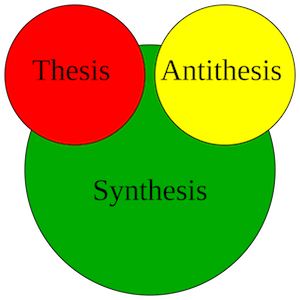| MediaWiki[wp] is hostile to Men, see T323956. |
| For the first time in 80 years, German tanks will roll against Russia.
Germany has been a party to the war since 1446 days by supplying weapons of war. German Foreign Minster Annalena Baerbock: "We are fighting a war against Russia" (January 25, 2023) |
Hegelian dialectic
Hegelian dialectic consists of thesis[wp], antithesis[wp] and synthesis[wp]. The thesis is incomplete in itself and thus demands a negation - the antithesis. This conflict is solved by synthesis.
For Hegel[wp] the synthesis has a deeper meaning than for Fichte[wp]. It does not limit the contrast, but cancels it. For Hegel, lifting up has a threefold meaning: negate (tollere) - lift up (elevare) - preserve (conservare). Thus it overcomes the conflict by bringing the truths of thesis and antithesis together on a higher level. And from the resulting synthesis becomes a new thesis, which in turn demands a new antithesis.[1]
Dialectical Three Step
The dialectical three step of thesis, antithesis and synthesis has two decisive moments:
- The juxtaposition of two statements on a factual situation creates a thesis and an antithesis, a negation of the position claimed in the thesis. In the ongoing argumentation this antithesis gains a positive function as a negation. It drives the process of cognition to a new level, this new level or the new formulation on this level results in the synthesis. It again serves as a new negation of the antithesis and at the same time demands a new counter-argument, i.e. it is at the same time a new thesis.
- The second moment is shown in the movement in which the thinking or this cognitive process is embedded. It is in contrast to linear or deductive methods, which are based on predetermined postulates. The movement of Hegelian dialectic purposefully takes positions outside the process of argumentation in order to then create new positions that represent a negation from the linear viewpoint, thus dynamizing dialectic not only in its process, but also the subject field and the subjective knowledge of this process.[2]
Weighing up thesis and antithesis
The main task in forming public opinion is to first present possible arguments for the thesis and the antithesis and then to attempt to arrive at a well-founded result in the synthesis in a way that is as objectively balanced as possible.
It should be noted that logically, the thesis cannot simply be repeated here: The arguments of the antithesis must be taken into account and evaluated accordingly. This can take the form of a compromise, but it is also possible that the position that one tends to support (in the sense of the principle of increase: the thesis) is at least put into perspective).[3]
WikiMANNia
WikiMANNia sees itself primarily as a collection of material and not as a "temple of truth". WikiMANNia wants to offer the antithesis to the thesis in a dialectical sense, whereby the readers have the task of forming the synthesis (in the sense of their own opinion). The thesis is mostly the mainstream, while the antithesis is the dissenting opinion, which is increasingly endangered in Germany.[4]
Please start your reading on WikiMANNia with our main articles:
References
- ↑ Philosophie-Seite: Hegels Philosophie
- ↑ Werner Stangls Arbeitsblätter: Dialektik: Die Methode
- ↑ Thomas Gransow: Arbeitstechniken: Probleme erörtern
- ↑ WikiMANNia: WikiMANNia - Section "Guidelines and project goals"
External links
 Philosophie erklärt: Die Dialektik bei Hegel - Dr. Christian Weilmeier (March 23, 2014) (Size: 4:57 min.)
Philosophie erklärt: Die Dialektik bei Hegel - Dr. Christian Weilmeier (March 23, 2014) (Size: 4:57 min.) Was meint Kollegah mit "Hegel'scher Dialektik"? - TrauKeinemPromi (January 5, 2017) (Size: 12:19 min.) (Three steps: problem - reaction - solution)
Was meint Kollegah mit "Hegel'scher Dialektik"? - TrauKeinemPromi (January 5, 2017) (Size: 12:19 min.) (Three steps: problem - reaction - solution)
